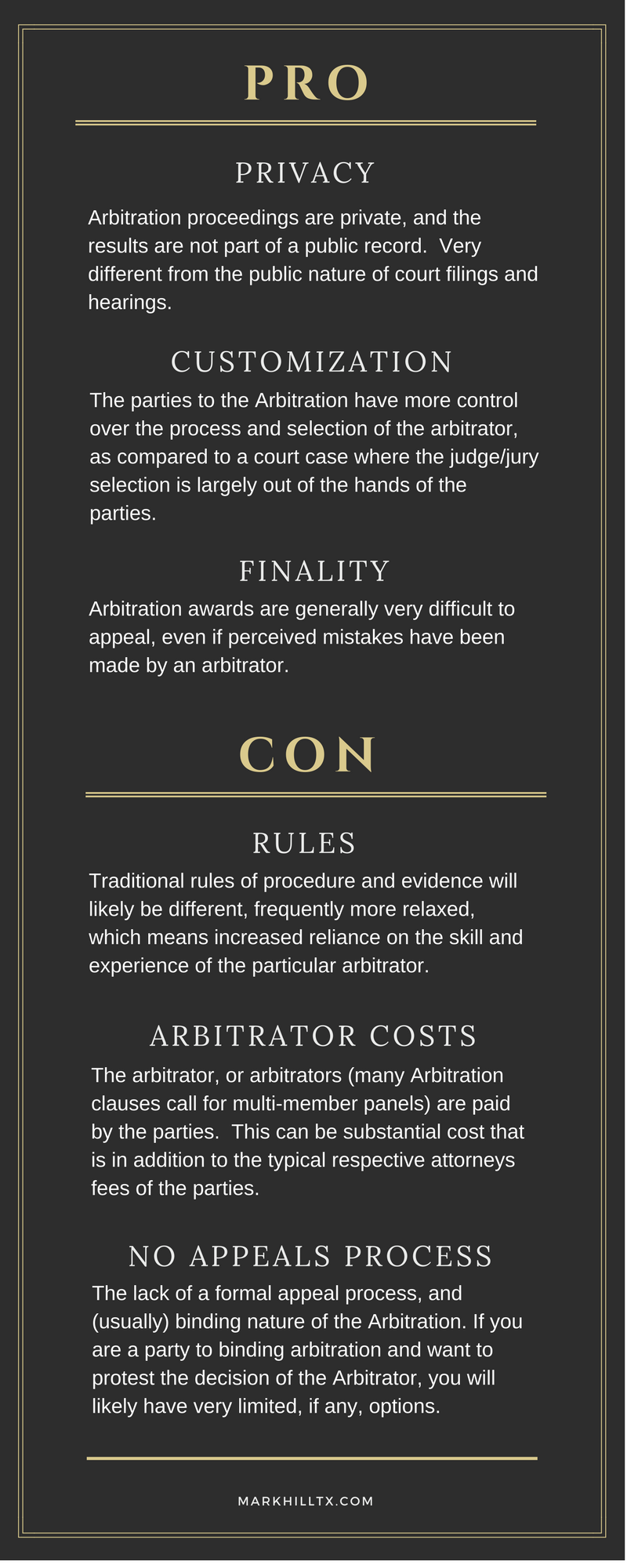Arbitration is an increasingly common alternative to traditional resolution of business disputes in state and federal courts. Most sophisticated businesses have used or experienced contracts with Arbitration clauses at some point in the past. In numerous industries, such as Construction, Network Marketing, IP, and Financial/Brokerage relationships, arbitration clauses have become prevalent. Arbitration is also frequently being used as a method of dispute resolution in employment relationships.
So how should businesses of all sizes view Arbitration? This post helps provide a practical understanding of what Arbitration actually is – and some Pros vs. Cons to consider.
Arbitration is a form of legal dispute resolution in which two parties agree (by contract) not to take their dispute to court, but instead resolve the dispute by hiring an arbitrator to hear both sides and render a decision.
 Notably absent from the above graphic are arbitration length and cost. Both time efficiency and cost are commonly thought to favor Arbitration proceedings, but that is not necessarily the case. Some studies, such as the one discussed in this Corporate Counsel post, have shown that both the length of Arbitration proceedings, and cost of the proceedings, can frequently be greater than that of traditional litigation. If these two factors are controlling for you and have persuaded you or your business to agree to Arbitration in the past, it may be time to reconsider.
As a business attorney having experienced both traditional litigation and Arbitration, I don’t have a particular preference and generally work to identify what are the most important considerations for the particular client. More times than not, it comes down to the privacy of arbitration versus its lack of a real appeal process. There are also different types of Arbitration itself, with several common third-party Arbitration providers, which I will leave for another discussion.
Legal disputes going through the Arbitration process is growing. Whether your business is already in contracts with Arbitration clauses, or is starting to use or see them in the course of its business, hopefully this post has helped bring a better understanding of the rival dispute resolution processes.
Notably absent from the above graphic are arbitration length and cost. Both time efficiency and cost are commonly thought to favor Arbitration proceedings, but that is not necessarily the case. Some studies, such as the one discussed in this Corporate Counsel post, have shown that both the length of Arbitration proceedings, and cost of the proceedings, can frequently be greater than that of traditional litigation. If these two factors are controlling for you and have persuaded you or your business to agree to Arbitration in the past, it may be time to reconsider.
As a business attorney having experienced both traditional litigation and Arbitration, I don’t have a particular preference and generally work to identify what are the most important considerations for the particular client. More times than not, it comes down to the privacy of arbitration versus its lack of a real appeal process. There are also different types of Arbitration itself, with several common third-party Arbitration providers, which I will leave for another discussion.
Legal disputes going through the Arbitration process is growing. Whether your business is already in contracts with Arbitration clauses, or is starting to use or see them in the course of its business, hopefully this post has helped bring a better understanding of the rival dispute resolution processes.
 Notably absent from the above graphic are arbitration length and cost. Both time efficiency and cost are commonly thought to favor Arbitration proceedings, but that is not necessarily the case. Some studies, such as the one discussed in this Corporate Counsel post, have shown that both the length of Arbitration proceedings, and cost of the proceedings, can frequently be greater than that of traditional litigation. If these two factors are controlling for you and have persuaded you or your business to agree to Arbitration in the past, it may be time to reconsider.
As a business attorney having experienced both traditional litigation and Arbitration, I don’t have a particular preference and generally work to identify what are the most important considerations for the particular client. More times than not, it comes down to the privacy of arbitration versus its lack of a real appeal process. There are also different types of Arbitration itself, with several common third-party Arbitration providers, which I will leave for another discussion.
Legal disputes going through the Arbitration process is growing. Whether your business is already in contracts with Arbitration clauses, or is starting to use or see them in the course of its business, hopefully this post has helped bring a better understanding of the rival dispute resolution processes.
Notably absent from the above graphic are arbitration length and cost. Both time efficiency and cost are commonly thought to favor Arbitration proceedings, but that is not necessarily the case. Some studies, such as the one discussed in this Corporate Counsel post, have shown that both the length of Arbitration proceedings, and cost of the proceedings, can frequently be greater than that of traditional litigation. If these two factors are controlling for you and have persuaded you or your business to agree to Arbitration in the past, it may be time to reconsider.
As a business attorney having experienced both traditional litigation and Arbitration, I don’t have a particular preference and generally work to identify what are the most important considerations for the particular client. More times than not, it comes down to the privacy of arbitration versus its lack of a real appeal process. There are also different types of Arbitration itself, with several common third-party Arbitration providers, which I will leave for another discussion.
Legal disputes going through the Arbitration process is growing. Whether your business is already in contracts with Arbitration clauses, or is starting to use or see them in the course of its business, hopefully this post has helped bring a better understanding of the rival dispute resolution processes. 
